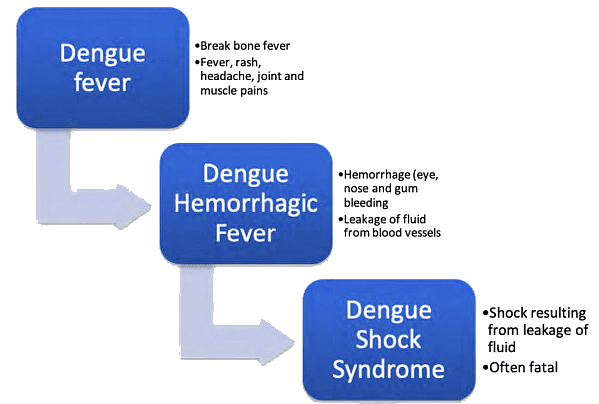Dengue | Medical Science Optional Notes for UPSC PDF Download
| Table of contents |

|
| Pathogenesis of Dengue fever |

|
| Lab Diagnosis of Dengue Fever |

|
| Clinical Manifestations of Dengue Fever |

|
| Spectrum of Dengue Fever |

|
Pathogenesis of Dengue fever
The Major pathophysiological changes noted in Dengue infection are
- Transient plasma leakage
- Elevated hematocrit levels
- Mild to moderate thrombocytopenia
- Manifestations of bleeding

In the laboratory diagnosis of Dengue Fever, the DENV genome comprises approximately 11,000 bases of positive-sense single-stranded RNA (ssRNA), which encodes three structural proteins:
- Capsid protein C
- Membrane protein M
- Envelope protein E
Additionally, it encodes seven nonstructural proteins:
- NS1
- NS2a
- NS2b
- NS3
- NS4a
- NS4b
- NS5
Lab Diagnosis of Dengue Fever


The tourniquet test has been incorporated into the new WHO case definition for dengue. This test serves as an indicator of capillary fragility and can function as a triage tool to distinguish patients with conditions like acute gastroenteritis from those with dengue.
Procedure for Conducting a Tourniquet Test:
- Measure the patient's blood pressure and document it, for instance, as 100/70.
- Inflate the cuff to a pressure midway between the systolic and diastolic values and sustain it for five minutes (e.g., (100 + 70) / 2 = 85 mm Hg).
- Deflate the cuff and wait for 2 minutes.
- Count the number of petechiae below the antecubital fossa.
- A positive test is indicated by 10 or more petechiae per square inch (CDC-10/Ghai-20).
Clinical Manifestations of Dengue Fever

Spectrum of Dengue Fever

Dengue Virus -Repeats
- Dengue Virus: Pathogenesis, Laboratory Diagnosis, and Prophylaxis (2009)
- Examination of Dengue Virus Morphology and Antigenic Types. Description of Clinical Manifestations and Laboratory Diagnosis of Dengue Fever (2015)
- Exploration of Pathogenesis and Laboratory Diagnosis of Dengue Hemorrhagic Fever (2018)
|
7 videos|219 docs
|
FAQs on Dengue - Medical Science Optional Notes for UPSC
| 1. What is the pathogenesis of Dengue fever? |  |
| 2. How is Dengue fever diagnosed in the laboratory? |  |
| 3. What are the clinical manifestations of Dengue fever? |  |
| 4. What is the spectrum of Dengue fever? |  |
| 5. Can Dengue fever be transmitted from person to person? |  |

|
Explore Courses for UPSC exam
|

|

















